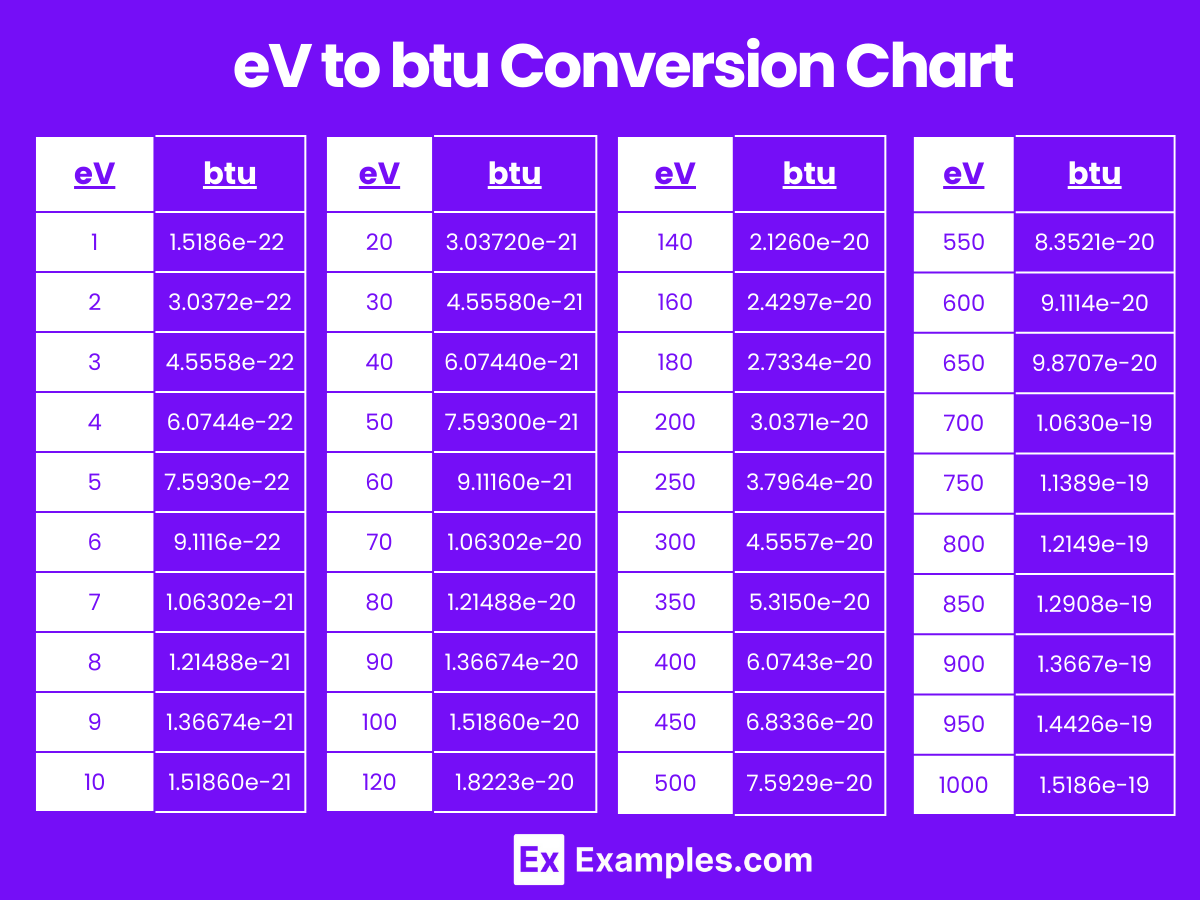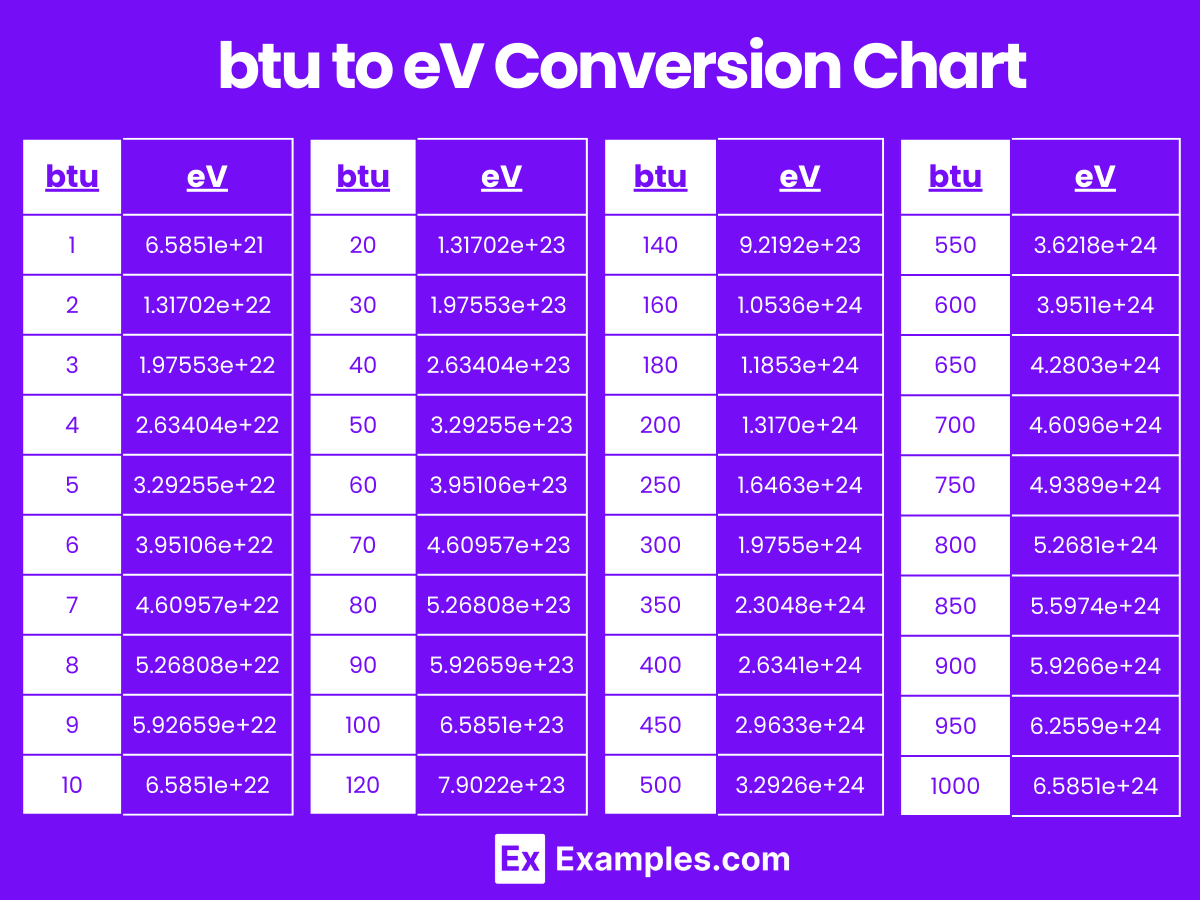Quickly and easily convert electronvolts to British Thermal Units at Examples.com. Just enter your data to get instant conversion results.
eV to BTU
Formula: Energy in British Thermal Units (BTU) = Energy in Electronvolts (eV) x 1.51857e-22
Electronvolt :
British Thermal Unit :
| Electronvolts | British Thermal Units |
|---|---|
| 1 | 1.51857e-22 |
BTU to eV
Formula: Energy in Electronvolts (eV) = Energy in British Thermal Units (BTU) ÷ 1.51857e-22
British Thermal Unit :
Electronvolt :
| British Thermal Units | Electronvolts |
|---|---|
| 1 | 6.58514260126303e+21 |
Energy Converters to Electronvolt
Energy Converters to British Thermal Unit
Conversion Factors:
Electronvolt to BTU: 1 electronvolt (eV) = 1.5186e-22 BTU
BTU to Electronvolt: 1 BTU = 1 / 1.5186e-22 eV
How to Convert Electronvolt to British Thermal Unit:
To convert electronvolts to BTU, multiply the number of electronvolts by 1.5186e-22.
BTU=eV×1.5186e−22
Example:
Convert 2000 electronvolts to BTU.
BTU=2000×1.5186e−22=3.0372e−19 BTU
How to Convert British Thermal Unit to Electronvolt:
To convert BTU to electronvolts, divide the number of BTUs by 1.5186e-22.
eV=BTU/1.5186e−22
Example:
Convert 3 BTU to electronvolts.
eV=3/1.5186e−22=1.97553e+22 eV
Electronvolt to British Thermal Unit Conversion Table
| Electronvolts (eV) | British Thermal Units (BTU) |
|---|---|
| 1 eV | 1.5186e-22 BTU |
| 2 eV | 3.0372e-22 BTU |
| 3 eV | 4.5558e-22 BTU |
| 4 eV | 6.0744e-22 BTU |
| 5 eV | 7.5930e-22 BTU |
| 6 eV | 9.1116e-22 BTU |
| 7 eV | 1.06302e-21 BTU |
| 8 eV | 1.21488e-21 BTU |
| 9 eV | 1.36674e-21 BTU |
| 10 eV | 1.51860e-21 BTU |
| 20 eV | 3.03720e-21 BTU |
| 30 eV | 4.55580e-21 BTU |
| 40 eV | 6.07440e-21 BTU |
| 50 eV | 7.59300e-21 BTU |
| 60 eV | 9.11160e-21 BTU |
| 70 eV | 1.06302e-20 BTU |
| 80 eV | 1.21488e-20 BTU |
| 90 eV | 1.36674e-20 BTU |
| 100 eV | 1.51860e-20 BTU |
eV to btu Conversion Chart

British Thermal Unit to Electronvolt Conversion Table
| British Thermal Units (BTU) | Electronvolts (eV) |
|---|---|
| 1 BTU | 6.5851e+21 eV |
| 2 BTU | 1.31702e+22 eV |
| 3 BTU | 1.97553e+22 eV |
| 4 BTU | 2.63404e+22 eV |
| 5 BTU | 3.29255e+22 eV |
| 6 BTU | 3.95106e+22 eV |
| 7 BTU | 4.60957e+22 eV |
| 8 BTU | 5.26808e+22 eV |
| 9 BTU | 5.92659e+22 eV |
| 10 BTU | 6.5851e+22 eV |
| 20 BTU | 1.31702e+23 eV |
| 30 BTU | 1.97553e+23 eV |
| 40 BTU | 2.63404e+23 eV |
| 50 BTU | 3.29255e+23 eV |
| 60 BTU | 3.95106e+23 eV |
| 70 BTU | 4.60957e+23 eV |
| 80 BTU | 5.26808e+23 eV |
| 90 BTU | 5.92659e+23 eV |
| 100 BTU | 6.5851e+23 eV |
btu to eV Conversion Chart

Difference Between Electronvolt to British Thermal Unit
| Feature | Electronvolt (eV) | British Thermal Unit (BTU) |
|---|---|---|
| Definition | An electronvolt is the amount of kinetic energy gained or lost by an electron when it is accelerated through an electric potential difference of one volt. | A British Thermal Unit is a traditional unit of heat; it is defined as the amount of heat required to raise the temperature of one pound of water by one degree Fahrenheit. |
| Measurement Scale | Very small energy scale, commonly used in atomic and particle physics. | Larger energy scale, commonly used in heating, cooling, and air conditioning industries. |
| Conversion Factor | 1 eV = 1.5186e-22 BTU | 1 BTU = 6.5851e+21 eV |
| Common Usage | Quantum mechanics, nuclear physics, and chemistry. | Heating and cooling systems, power generation, and energy consumption. |
| Symbol | eV | BTU |
| Context of Application | Describes energy levels of electrons, photons, and other particles. | Describes energy required to heat or cool spaces, measure fuel energy content. |
| Order of Magnitude | Extremely small energy quantities. | Significantly larger energy quantities. |
| Practical Examples | Energy changes in atomic reactions, electronic transitions. | Energy output of heating systems, air conditioning units, and fuels. |
1. Solved Examples on Converting Electronvolt to British Thermal Unit
Example 1:
Convert 5000 electronvolts to BTU.
BTU=5000×1.5186e−22
BTU=7.5930e−19
Example 2:
Convert 2 electronvolts to BTU.
BTU=15000×1.5186e−22
BTU=2.2779e−18
Example 3:
Convert 25000 eV to BTU.
BTU=25000×1.5186e−22
BTU=3.7965e−18
Example 4:
Convert 75000 eV to BTU.
BTU=75000×1.5186e−22
BTU=1.13895e−17
Example 5:
Convert 100000 eV to BTU.
BTU=100000×1.5186e−22
BTU=1.5186e−17
2. Solved Examples on Converting British Thermal Unit to Electronvolt
Example 1
Convert 1 BTU to electronvolts.
1 BTU = 1 / 1.5186e-22 eV ≈ 6.586e+21 eV
Example 2
Convert 2 BTU to electronvolts.
2 BTU = 2 / 1.5186e-22 eV ≈ 1.317e+22 eV
Example 3
Convert 5 BTU to electronvolts.
5 BTU = 5 / 1.5186e-22 eV ≈ 3.293e+22 eV
Example 4
Convert 10 BTU to electronvolts.
10 BTU = 10 / 1.5186e-22 eV ≈ 6.586e+22 eV
Example 5
Convert 50 BTU to electronvolts.
50 BTU = 50 / 1.5186e-22 eV ≈ 3.293e+23 eV
Is the conversion factor between eV and BTU constant?
Yes, the conversion factor between eV and BTU is a constant value, based on fundamental physical constants. It does not change and can be used reliably in conversions.
Are there tools or calculators available for this conversion?
Yes, there are numerous online tools and calculators that can easily convert electronvolts to BTUs and vice versa. These tools can be found on various scientific and engineering websites.
Why is the conversion between eV and BTU important?
The conversion between electronvolts and BTUs is important in fields that deal with both atomic-scale energy measurements (eV) and macroscopic energy measurements (BTU), such as in some areas of materials science and engineering.
What are some practical applications of this conversion?
This conversion is used in various scientific research fields, such as particle physics, nuclear physics, and material science, where it’s necessary to relate microscopic energy scales to macroscopic energy scales for practical applications and understanding.
Can you convert large quantities of eV directly to BTU?
Yes, you can convert any quantity of electronvolts to BTU using the same conversion factor. For large quantities, it might be convenient to use scientific notation to keep the calculations manageable.

